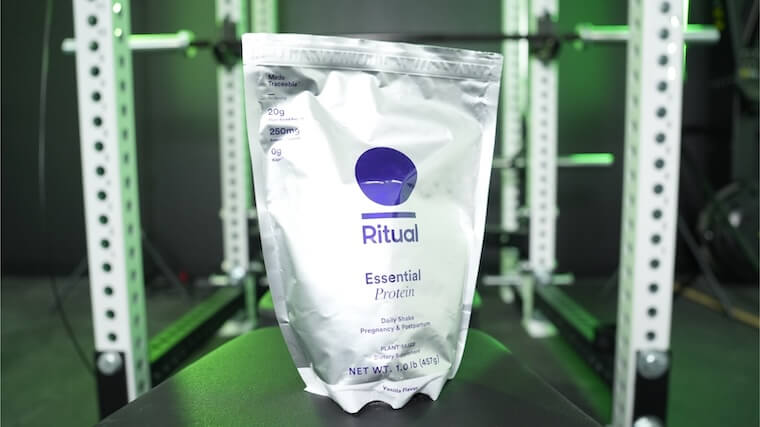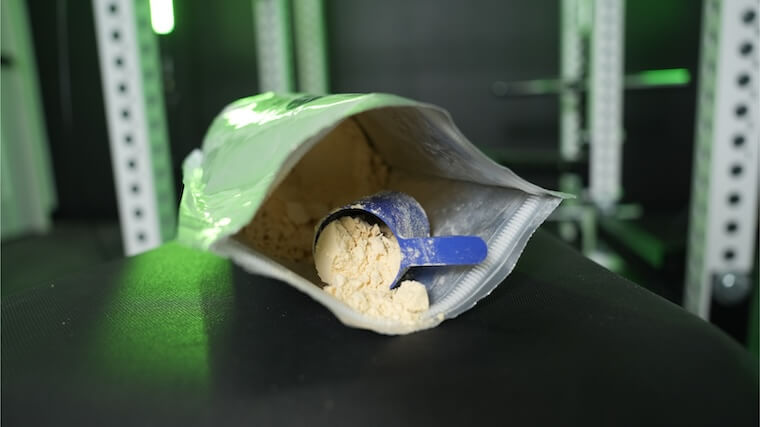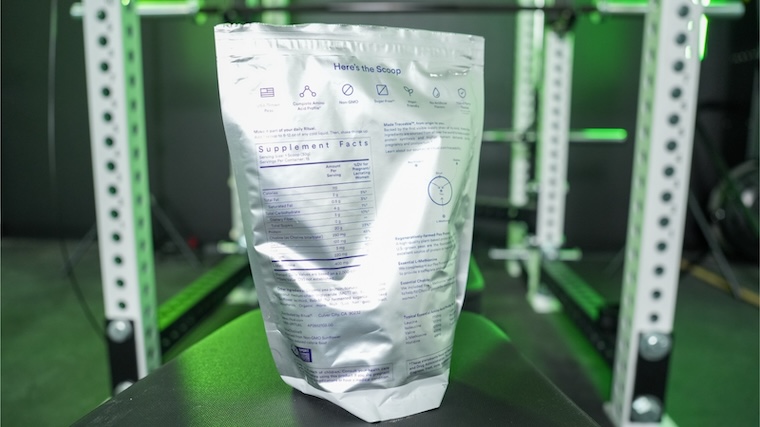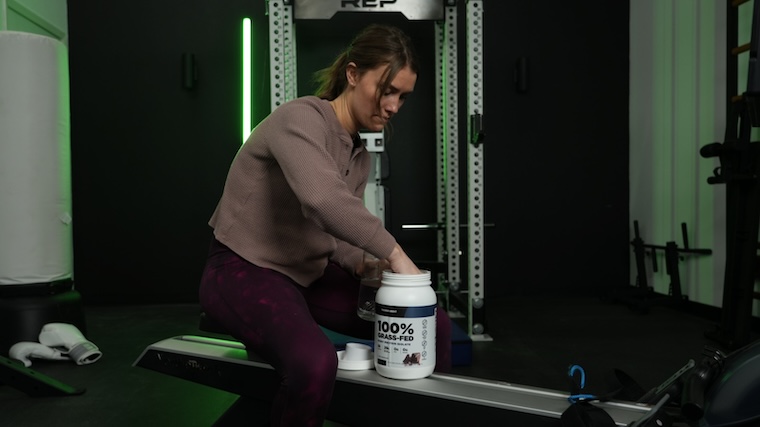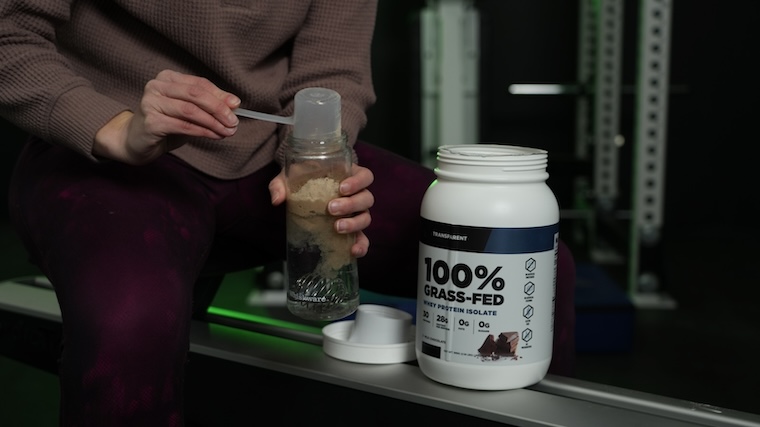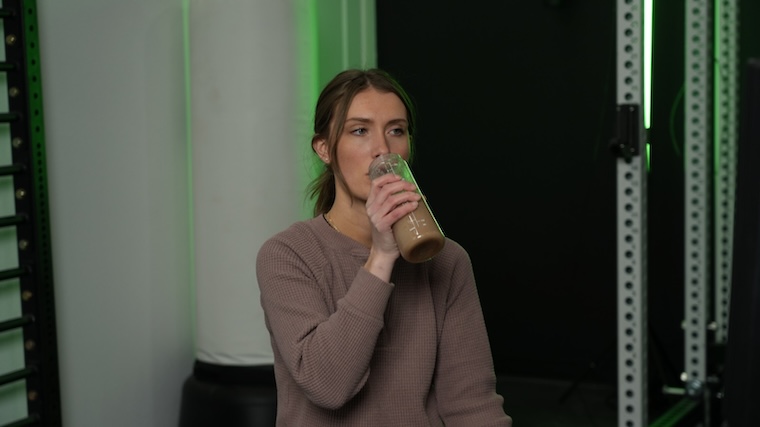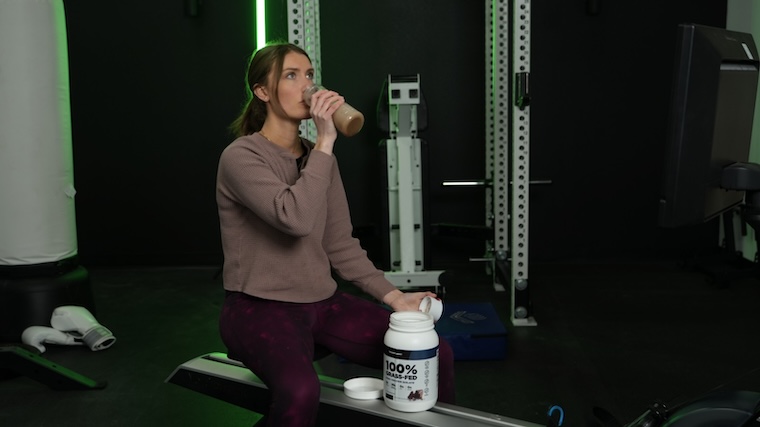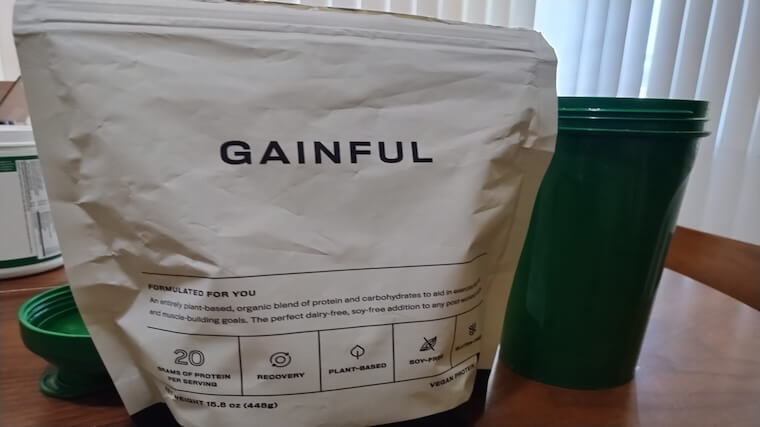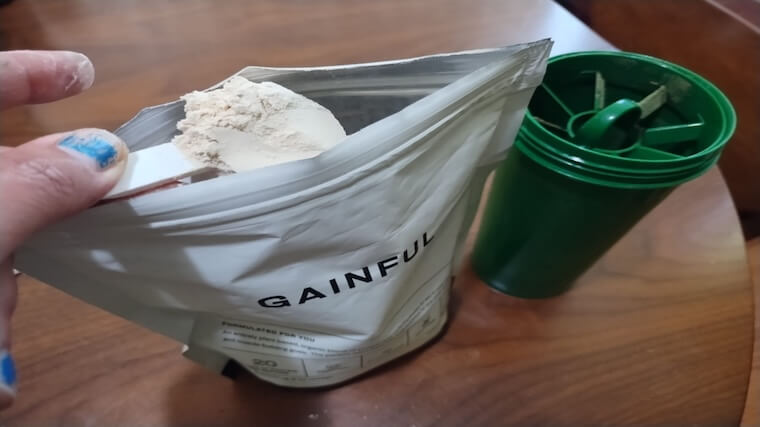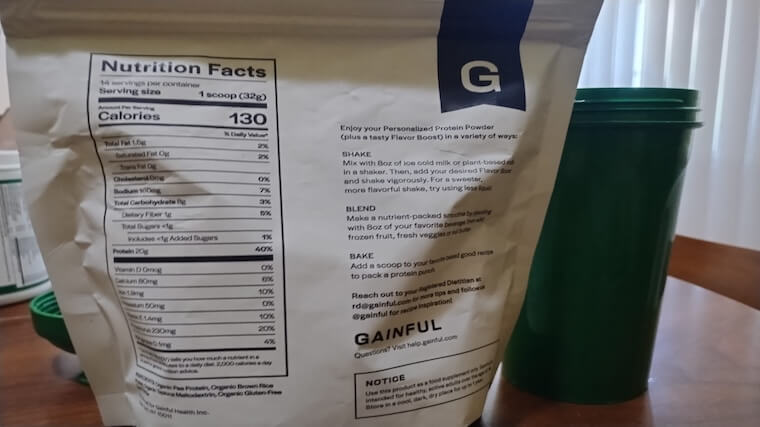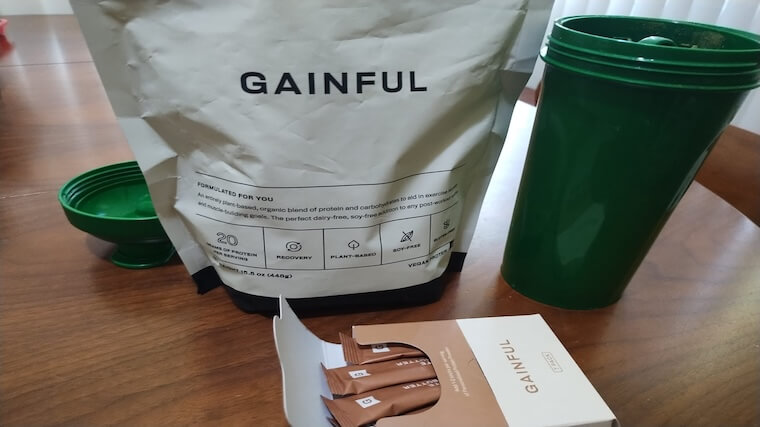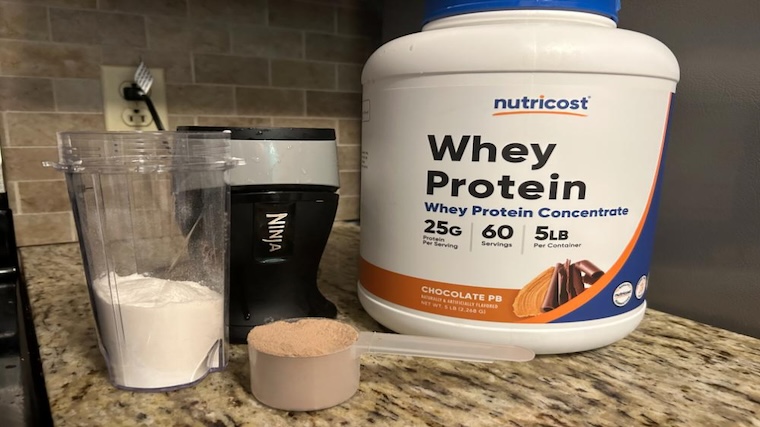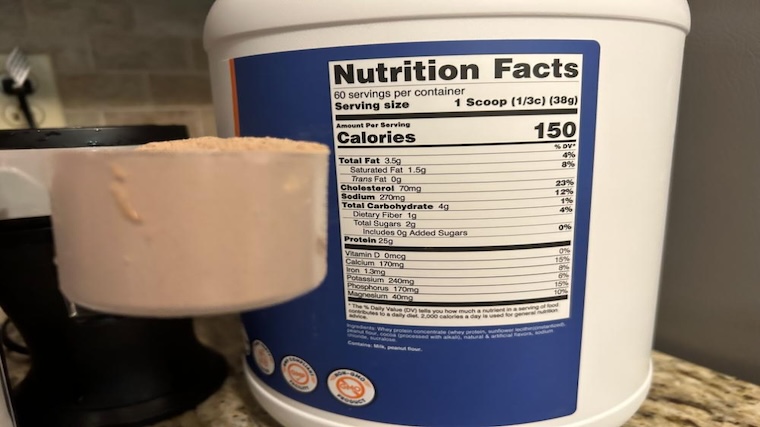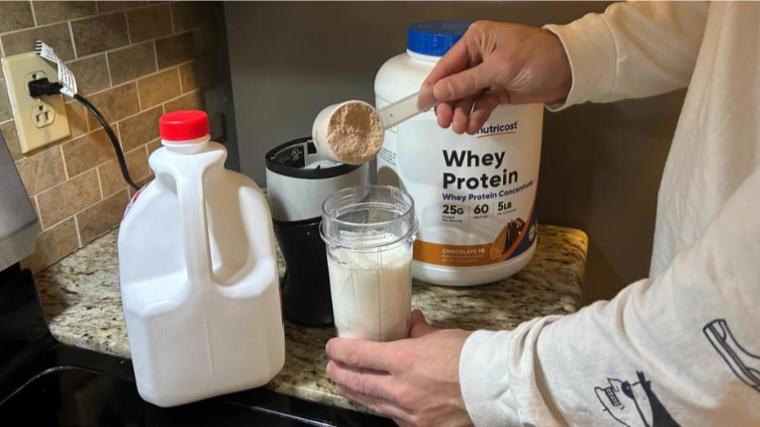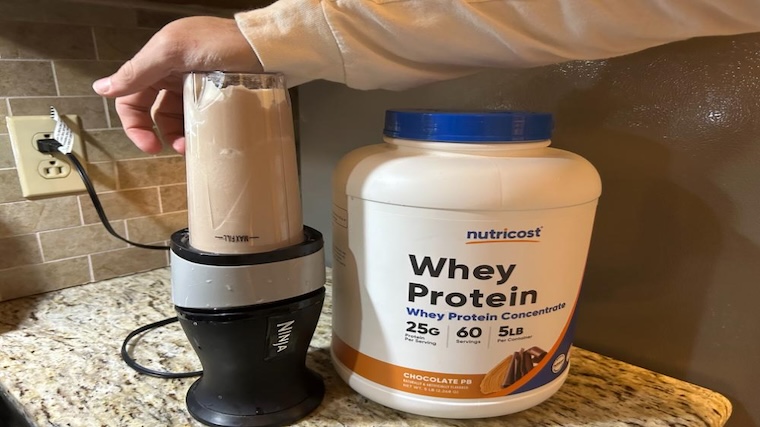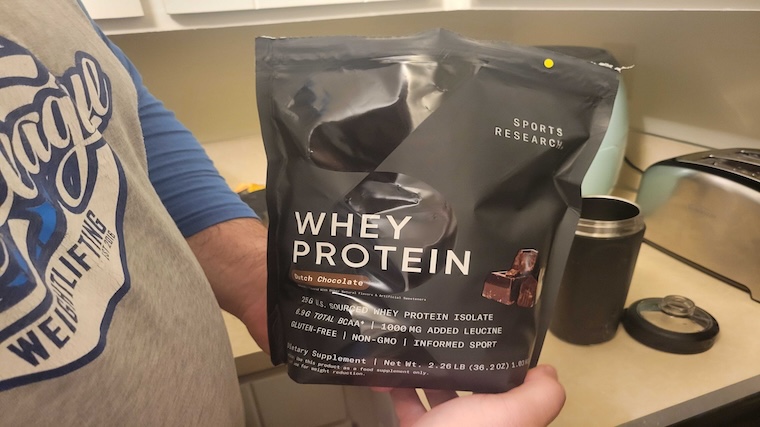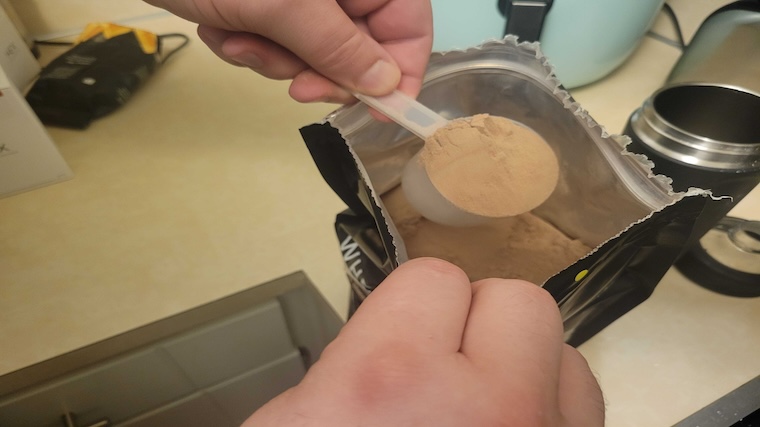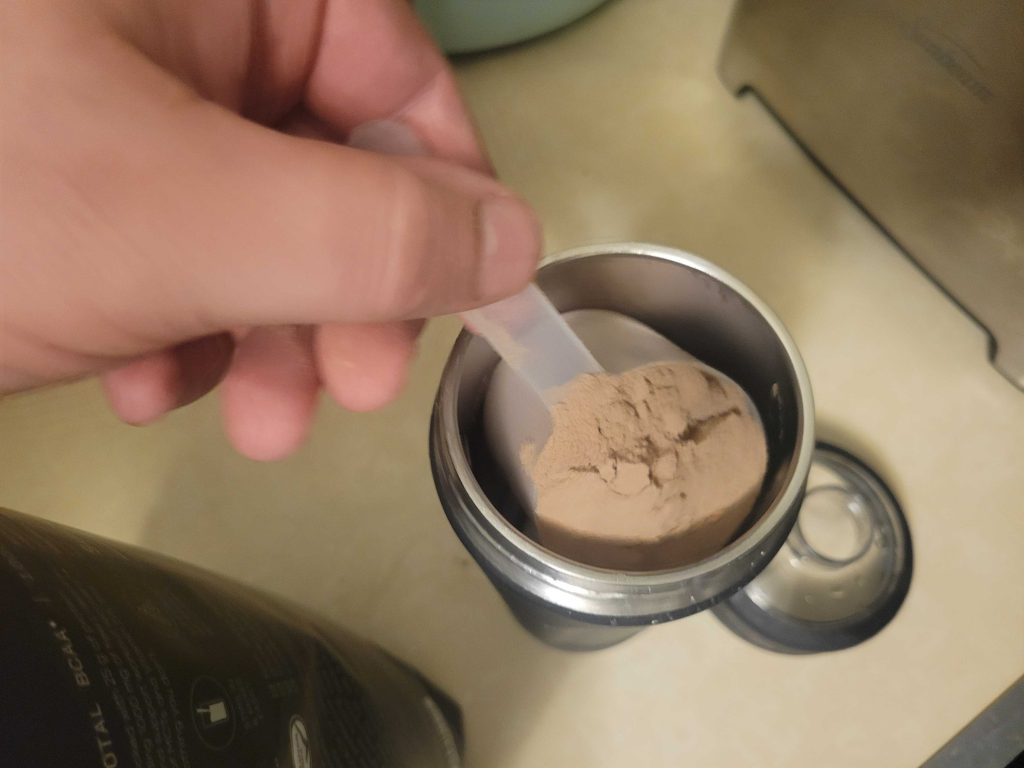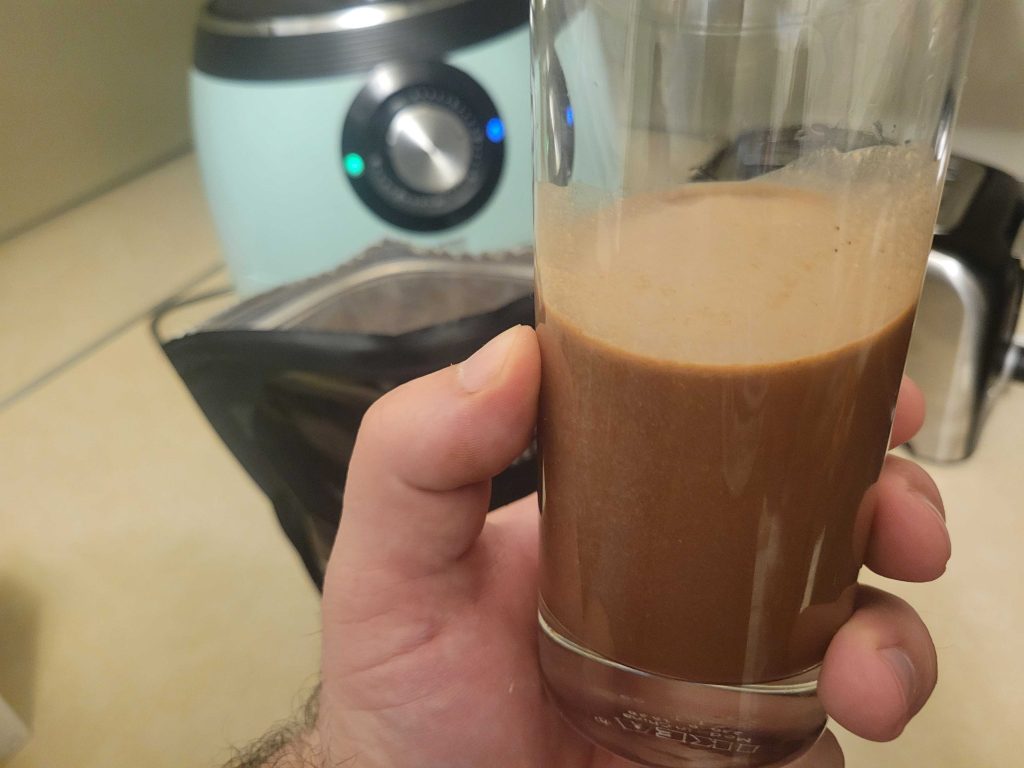Protein is crucial for our bodies and becomes even more vital when growing a tiny human (or two or more!). Getting enough protein supports both parent and baby during pregnancy, but hurdles like food aversions, fatigue, and morning sickness can make it tricky. Navigating these challenges with protein-packed convenience and creativity can help keep you and your little one well-nourished.
As with the best greens powders for pregnancy, choosing the right protein supplement involves careful consideration. That’s why I, a registered dietitian nutritionist, collaborated with BarBend’s expert reviewers and testers to bring you a curated list of the best protein powders for pregnancy. While we always recommend seeking professional guidance, we’re also here to offer insights on whether you need a protein powder and how to choose the best one for you.
The 6 Best Protein Powders for Pregnancy of 2026
- Best Protein Powder for Pregnancy Overall: Ritual Essential Daily Shake Pregnancy and Postpartum
- Best Protein Powder for Weight Gain During Pregnancy: Transparent Labs Whey Protein Isolate
- Best Vegan Protein Powder for Pregnancy: Gainful Plant Protein
- Best Budget Protein Powder for Pregnancy: Nutricost Whey Protein Concentrate
- Best Clean Protein Powder for Pregnancy: Sports Research Whey Protein Isolate
- Best Organic Protein Powder for Pregnancy: Organifi Complete Protein
Editor’s note: The content on BarBend is meant to be informative in nature, but it should not be taken as medical advice. The opinions and articles on this site are not intended for use as diagnosis, prevention, and/or treatment of health problems. It’s always a good idea to talk to your doctor before beginning a new fitness, nutritional, and/or supplement routine. Individual needs for vitamins and minerals will vary.
Best Protein Powder for Pregnancy Overall: Ritual Essential Daily Shake Pregnancy and Postpartum
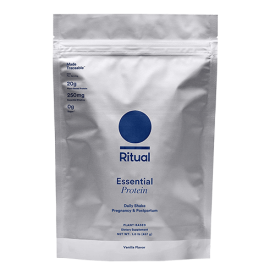
This vanilla-flavored protein powder is designed specifically for expecting and newfound mothers with traceable ingredients at worthwhile dosages. Additionally, Essential Protein Pregnancy and Postpartum delivers 250 milligrams of essential choline per serving, a vital component that can help support fetal development during pregnancy and lactation.
Specs
- Price Per Serving: $2.93
- Protein Source: Organic pea protein
- Protein Per Serving: 20g
- Calories Per Serving: 115
- Available Flavors: Vanilla
- Third-Party Testing: Yes
Ritual Essential Daily Shake Pregnancy and Postpartum takes the crown as the top choice for expecting moms and other birthing parents — and with good reason. It was born out of founder Katerina Schneider’s pregnancy dilemma as she struggled to find trustworthy options. That challenge inspired her to create Ritual, crafting clean, simple, research-backed formulas — like Ritual Essential Vitamins and this shake for pregnant women and people.
BarBend expert reviewer Chelsea Rae Bourgeois, M.S., R.D.N., L.D. says, “Each scoop of Ritual’s Essential Protein Pregnancy and Postpartum includes high-quality protein and essential nutrients to support a healthy pregnancy and postpartum journey.” Each serving provides 20 grams of pea-based protein, a complete protein source, and 250 milligrams of choline. (5) Bourgeois elaborates, “Choline is essential for a baby’s brain development during pregnancy, and its need increases during lactation postpartum — so it’s a major bonus in this protein powder!” (3)
Bourgeois also highlights its traceable ingredients and Informed-Sport certification, assuring it’s free from banned substances. However, with 220 milligrams of sodium (about 10% of the daily recommended intake), she slightly lowered its formulation score to 4.5 out of 5.
Our product tester, a certified personal trainer, is pleasantly surprised by the taste. “I didn’t have high hopes with plant-based protein powders, but this one was enjoyable, especially in smoothies,” they say. Despite a slight pea flavor, they feel it’s sweet enough to mask the earthy undertones, earning a 3.75 out of 5.
As for solubility, our product tester gives the plant-based powder a solid 4 out of 5. “This powder mixed fairly easily in my shaker cup with no major clumps, although I did notice a bit of grit in the texture,” the tester reports. “That said, it’s far from the worst plant protein I’ve encountered regarding solubility.”
Despite the price being higher at $2.67 per serving and our tester’s mixed feelings about the taste, they’re willing to try it again thanks to the added choline. They note, “From experience, any supplement designed for a healthy pregnancy and baby will attract attention from parents wanting the best for their little ones.”
Best Protein Powder for Weight Gain During Pregnancy: Transparent Labs Whey Protein Isolate
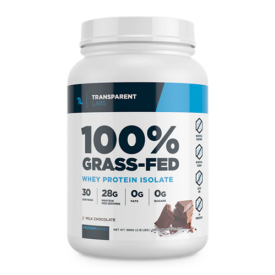
With 8 different flavors and 28 grams of whey protein from hormone-free, grass-fed cows, Transparent Labs Whey Protein Isolate is an excellent way to hit your protein macros.
Specs
- Price Per Serving: $2.00 for a one-time purchase and subscription
- Protein Source: Grass-fed whey protein isolate
- Protein Per Serving: 28g
- Calories Per Serving: 130-150
- Available Flavors: Blueberry Pancakes, Chocolate Chip Banana Bread, Chocolate Peanut Butter, Cinnamon French Toast, Dark Chocolate, French Vanilla, Milk Chocolate, Mint Chocolate Chip, Oatmeal Chocolate Chip Cookie, Unflavored, Strawberry Milkshake, Vanilla Peanut Butter
- Third-Party Testing: Yes
Healthy pregnancy weight gain varies, but pregnant people should generally aim for 25 to 35 pounds, starting with 1 to 4 pounds in the first trimester. During the second and third trimesters, gaining about 1 pound per week is ideal, supported by an extra 300 calories daily. (6) One serving of Transparent Labs Whey Protein Isolate can cover half of those calories, enhancing nutritional needs without compromising quality.
Transparent Labs 100% Grass-Fed Whey Protein Isolate features a short list of premium ingredients, with its star being 28 grams of grass-fed whey protein per serving. Isolates also contain lower lactose levels, potentially suiting those with lactose intolerance or dairy sensitivities. (7)
Our expert reviewer Chelsea Rae Bourgeois, M.S., R.D.N., L.D. praises Transparent Labs formulation: “I love that Transparent Labs Whey Protein Isolate is free from artificial sweeteners, food dyes, and preservatives. You get 28 grams of high-quality protein without any unnecessary fluff.”
However, Bourgeois points out that some flavors contain up to 370 milligrams of sodium per scoop, higher than many other protein powders. “Those who are watching their sodium intake may be deterred by the amount of sodium per scoop.” Despite this, she rates it 4.5 out of 5, crediting its strong formulation of whey protein, Himalayan rock salt, stevia, and natural flavors.
Transparent Labs ranks in the top 10% for label accuracy and purity in our independent testing, with zero traces of pesticides, phthalates, or bisphenols. While trace amounts of metals were detected, it still placed in the top 25% of protein powders. If you’re cautious about heavy metal exposure during pregnancy, we recommend reviewing their certificate of analysis and consulting your doctor for guidance.

In terms of solubility, our product tester found the powder mixed well in a standard shaker cup, with occasional clumping and residue. A pro tip they shared: “Blend it with a milk base for a richer, creamier taste. It can be a bit chalky, but still enjoyable,” giving the taste a 4 out of 5.
Read our full Transparent Labs Whey Protein Isolate Review.
Best Vegan Protein Powder for Pregnancy: Gainful Plant Protein
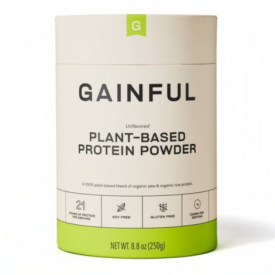
Gainful Plant-Based Protein Powder offers up to 24 grams of organic brown rice and pea protein, which delivers a complete amino acid profile. Right now, take 50% off your first order with the code: BF50.
Specs
- Price Per Serving: Starting at $3.21 with a subscription
- Protein Source: Organic pea protein, organic rice protein
- Protein Per Serving: 21g
- Calories Per Serving: 110
- Available Flavors: Chocolate Peanut Butter, Cinnamon Toast, Cookies & Cream, Madagascar Vanilla, Rich Cocoa, Sea Salt Caramel, Strawberry Cream
- Third-Party Testing: N/A
Gainful stands out as one of the best vegan protein powders for its customizable plant protein to meet your needs and preferences. Featuring only organic pea and rice proteins, its high-quality vegan formula is impressively simple and provides a complete amino acid profile with minimal carbohydrates and fat. (5)
Our expert reviewer Chelsea Rae Bourgeois, M.S., R.D.N., L.D. gives this no-frills formula a 4.5 out of 5, saying, “I like that Gainful offers a personalized protein powder formula that’s unsweetened and free from artificial ingredients.” If you’re not into plant-based options, Gainful’s personalized quiz can help match you with a whey-based formula tailored to your nutritional goals and fitness routine.
Now, if you’re thinking, “Only two ingredients and unsweetened — what about flavor?” Gainful offers seven “Flavor Boosts” to choose from (and a variety pack with all) to keep things exciting. Our certified personal trainer tester loves Gainful’s customizable flavor system, saying, “Each shake can be a new experience.” They give it a perfect 5 out of 5 for creativity, especially enjoying Chocolate and Vanilla while looking forward to trying bolder flavors like Salted Caramel.
On the downside, the solubility of the plant-based blend gets a 3 out of 5 from our tester, who noticed some clumping and recommended using a high-powered countertop blender over a standard shaker.
There’s no denying that Gainful’s subscription model has a premium price, starting at $3.21 per serving, though you can save by bundling. As our reviewer Bourgeois points out, “While I think Gainful is on to something here, there may be comparable, more cost-effective options out there.”
That said, the subscription does come with its perks. Along with keeping your protein supply steady, Bourgeois highlights a standout benefit, especially for those managing pregnancy nutrition: “I really like that Gainful has registered dietitians available to their subscribing customers, especially since they provide their buyers with personalized formulas. Goals change over time, as do nutrition needs, so it’s great that there’s support in place when customers have questions about switching formulas.”
Best Budget Protein Powder for Pregnancy: Nutricost Whey Protein Concentrate
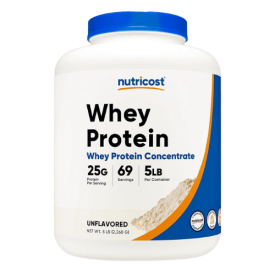
Need a protein powder that’s light on cost yet heavy on flavor? Available in four traditional tastes — Chocolate Peanut Butter, Chocolate, Strawberry Milkshake, and Vanilla — this Nutricost offering is available for less than $1 per serving, which can be ideal for athletes looking to build a well-rounded supplement regimen on a budget.
Specs
- Price Per Serving: As little as $0.78 per serving
- Protein Source: Whey protein concentrate
- Protein Per Serving: 25g
- Calories Per Serving: 130-140
- Available Flavors: Chocolate, Chocolate Peanut Butter, Strawberry Milkshake, Vanilla, Unflavored
- Third-Party Testing: N/A
If you’re keeping a watchful eye on your budget, Nutricost protein powder is worth a look. Prices fluctuate based on flavor, container size, and whether you snag a subscription, ranging from a wallet-friendly $0.78 to $1.22 per serving. And despite the affordable cost, you won’t have to sacrifice value. Our expert reviewer Chelsea Rae Bourgeois, M.S., R.D.N., L.D., assures, “Nutricost Whey Concentrate is a pretty lean protein powder with an impressive amino acid profile.”
For those who like to keep things simple, the Unflavored Nutricost Whey Protein Concentrate sticks to whey protein concentrate (packing 25 grams of protein per serving) and sunflower lecithin to stabilize the mixture. While whey concentrate isn’t as stripped down as protein isolates, it still boasts a potent punch of essential amino acids (EAAs) and branched-chain amino acids (BCAAs). (7) The protein powder also contains up to 3 grams of carbs and fat, depending on your flavor choice.
Bourgeois appreciates its nutrient transparency, noting, “I like when supplements provide specific nutrients, so it’s easier to fit them into a well-balanced diet and bridge nutrition gaps as needed. Plus, it contains a 2:1:1 ratio of your BCAAs, which research has shown to be most effective.”
However, Bourgeois points out a couple of downsides: “It contains sucralose, which can be tricky for digestion. Also, I’d love to see third-party testing for safety and purity.” She rates the formula 3.5 out of 5, praising the macronutrient and BCAA ratios but encouraging improvement for its artificial sweeteners and testing protocols.
If sucralose doesn’t bother your taste buds or tummy, Nutricost might hit the spot. Our product tester gives it a perfect 5 out of 5, praising both its taste and solubility. “Even with just a shaker cup, there were no clumps or gritty residue after mixing,” they share. It also mixes well in water, but they highlight, “The flavor really shines with milk. My Chocolate Peanut Butter variety had a creamy texture with just the right hint of sweetness.
Our tester also hasn’t experienced any adverse side effects, rating it another 5 out of 5 in this category.
Best Clean Protein Powder for Pregnancy: Sports Research Whey Protein Isolate
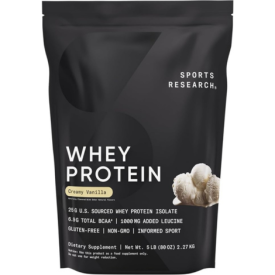
Offering 25 grams pf whey protein isolate alongside nearly 7 grams of BCAAs, Sports Research Whey Protein Isolate is a great option for those looking to supplement their diets, build muscle, and enhance workout recovery.
Specs
- Price Per Serving: $1.46 for a one-time purchase, $1.31 with a subscription
- Protein Source: Whey protein isolate
- Protein Per Serving: 25g
- Calories Per Serving: 140-150
- Available Flavors: Creamy Vanilla, Dutch Chocolate
- Third-Party Testing: Yes
While “clean” protein powder doesn’t have a strict definition, it generally means a high-quality blend with minimal additives. Sports Research Whey Protein Isolate fits this description well, especially in its Creamy Vanilla flavor. BarBend expert reviewer Chelsea Rae Bourgeois, M.S., R.D.N., L.D., gives it a solid 4.5 out of 5, praising its quality.
“This is a pretty impressive whey protein powder — just take a look at its amino acid profile,” she notes. “It contains 25 grams of protein per serving, including 6.9 g of BCAAs, but minimal carbs and fat. If you’re looking to increase your protein intake without skewing your other macros, this could be a great option.”
The Creamy Vanilla flavor boasts a streamlined ingredient list: whey protein isolate (25 grams per serving), sodium caseinate (a natural milk protein), sea salt, and stevia. (8) However, its Dutch Chocolate flavor includes natural flavors — like cocoa powder and sea salt — and fewer “clean” ingredients like artificial sweeteners such as sucralose and acesulfame potassium. These aren’t necessarily “bad,” but they don’t meet the “clean” standard as strictly.
Bourgeois acknowledges that with only two flavors, you might face flavor fatigue. However, our product tester, a former Olympian, raves about its quality, giving it a 5 out of 5 for solubility and taste. “The flavor is great, the powder mixes effortlessly, and I didn’t experience any discomfort after drinking a shake,” they report. “Blending with water gives a lighter flavor, but there were no clumps or residue, which is perfect before a workout.”
Bourgeois and our tester appreciate that it’s Informed-Sport certified, which is crucial for athletes who undergo drug testing. Our tester adds, “As a competitive strength athlete, third-party testing is something I always look for in a protein powder.”
Best Organic Protein Powder for Pregnancy: Organifi Complete Protein
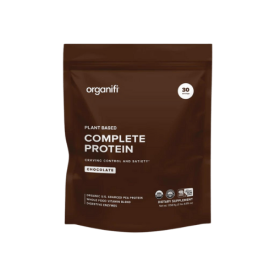
This organic, plant-based protein powder features a balanced macro profile and even includes 3 grams of dietary fiber per serving. Plus, Organifi Complete Protein mixes easily even without an agitator, leaving you with no unwanted clumps or residue before that first sip.
Specs
- Price Per Serving: $2.67 for a one-time purchase, $2.40 with a subscription
- Protein Source: Organic pea protein, organic quinoa flour, organic pumpkin (seed) protein
- Protein Per Serving: 18g
- Calories Per Serving: 170
- Available Flavors: Chocolate, Vanilla
- Third-Party Testing: N/A
While protein powder flaunts some organic ingredients, Organifi Complete Protein boasts its USDA Certified Organic and non-GMO stamp of approval. Except for its digestive enzyme blend, every ingredient is organic and free of chemical fertilizers, pesticides, and artificial additives.
The plant-based formula delivers 18 grams of protein from organic pea protein, quinoa flour, and pumpkin seed protein for a well-rounded amino acid profile. (9) It also provides 3 grams of dietary fiber and a digestive blend to support digestion, which can be especially beneficial during pregnancy. (4) If you’re looking to boost gut health even further, exploring the best probiotic supplements for women might be worth your while.
The plant-based powder also packs essential vitamins and minerals to support pregnancy and vegan diets, like iron and calcium. (10) However, it also contains higher sodium, fat, and carb content compared to other protein powders, which may not be suitable if monitoring salt intake and if lean protein is your goal, resulting in a 3 out of 5 formulation rating.
Regarding flavor, our tester rates it a 3 out of 5, noting that mixing with unsweetened oat milk overpowered the Vanilla. They share, “I’ve had other plant proteins where the flavor shines through no matter what I mix it with, so this was a bit disappointing. That said, it sort of tasted like buttermilk pancakes, which I didn’t mind.”
On the flip side, its solubility earns a perfect 5 out of 5: “This powder mixed easily in a shaker bottle without an agitator,” our tester notes. “I was nervous at first, but there were no clumps or residue left behind.”
All things considered, our tester gives the overall experience a solid 4 out of 5. “The shake was thicker than others I’ve tried, but I prefer that — it left me feeling fuller and more ready to tackle the day.” They’d recommend Organifi Complete Protein as a reliable plant-based option, adding, “I’d use it again if I had the chance.”
How We Tested and Chose the Best Protein Powders for Pregnancy
The BarBend team is made up of competitive athletes, certified personal trainers, and lifelong fitness enthusiasts. To determine the best protein powders for pregnancy, we’ve tested nearly 100 different supplements from some of the industry’s most trusted brands using a multi-point methodology to rate each profile on a scale of 1 (lowest) to 5 (highest). Below are some of the categories and components that played into our rankings.
We also worked with a third-party accredited lab of our own to rate and score a handful of picks, analyzing each product’s purity and label accuracy. Ratings for areas including the presence of metals, pesticides, phthalates, bisphenols, and overall label accuracy were based on how well each protein sample compared to others in the sample pool.
For further information on how we trial and test the products chosen for this guide and more, be sure to read the BarBend Supplement Testing Methodology page.
- Protein content and source: The Recommended Daily Allowance (RDA) increases from 46 grams daily in the first trimester to 71 grams in the second and third trimesters to support your baby’s growth, with the American Pregnancy Association recommending 75 to 100 grams. (1)(2) We’ve selected protein powders rich in protein and essential amino acids to meet these needs. We also offer different types of protein powders — such as whey and plant-based options — to suit various dietary preferences and requirements.
- Other ingredients: While protein should take center stage, other ingredients can boost flavor, solubility, and nutrition. We focus on powders with beneficial ingredients, like choline and fiber, and avoid unnecessary fillers and added sugars. (3)(4)
- Third-party testing: Since the FDA doesn’t regulate dietary supplements, independent lab verification is the gold standard to ensure you get exactly what’s on the label — and nothing you shouldn’t. We prioritize protein powders that undergo third-party testing, giving you peace of mind that what you consume is safe for you and your baby.
- Cost: Budgeting for a new baby can be challenging, but that shouldn’t mean compromising nutritional value and quality. We’ve considered various price points to fit different budgets, ensuring you get top-notch nutrition without breaking the bank.
- Taste and solubility: Let’s face it — if it doesn’t taste good, you likely won’t drink it. A chalky or unappetizing shake can be even harder to stomach if experiencing food aversions and texture sensitivities that often intensify during pregnancy. We made sure to include only those protein powders that not only pack a nutritional punch but are also smooth, tasty, and easy to mix.
Benefits of Protein Powders for Pregnancy
Protein powders offer pregnant women and other birthing parents a convenient, versatile way to meet their daily protein needs while balancing life’s demands. They can help mitigate food aversions, satisfy cravings healthily, and deliver essential nutrients that bolster maternal health and promote optimal birth outcomes. Here’s a closer look into how protein powders can enhance prenatal nutrition and support a healthy pregnancy:
- Offers convenience: Quickly mixing a protein shake provides expecting parents with an easy way to get enough protein. Such convenience helps balance the demands of work, exercise, and other life responsibilities during pregnancy.
- Adds versatile nutrition: You can easily incorporate protein powders into various meals and snacks, from smoothies to baked goods. This flexibility keeps things interesting and helps prevent protein shake fatigue.
- May ease food aversions: Protein powders may be more tolerable if you experience nausea or aversion to protein-rich foods, helping fill critical dietary gaps during such times.
- Helps satisfy cravings healthy: With so many flavors, ranging from chocolate to fruity options, protein powders satisfy cravings without adding unnecessary sugars. Stabilizing blood sugar levels while increasing protein intake further enhances their benefit. (11)
- May fuel a healthy pregnancy: Protein powders deliver amino acids crucial for the parent and baby’s health during pregnancy. Amino acids support the substantial growth and changes experienced from conception to birth. (12)
- May support optimal birth weights: Consistently maintaining adequate protein intake can reduce the risks associated with low birth weight. Healthier long-term outcomes for children often result from proper prenatal nutrition. (13)
- Boosts essential prenatal vitamins and minerals: Whether naturally sourced or intentionally added, protein powders often contain beneficial micronutrients — like calcium and choline — to support a healthy pregnancy. (10)
How Much Do Protein Powders for Pregnancy Cost?
Our research reveals protein powders for pregnancy generally cost about $2.18 per serving, though prices can vary between $0.78 and $3.29. This variation largely depends on factors like brand, pack size, formulation, and any certifications the product might have.
| Best Protein Powder for Pregnancy Overall | Ritual Essential Daily Shake Pregnancy and Postpartum | $2.93 per serving |
| Best Protein Powder for Weight Gain During Pregnancy | Transparent Labs Whey Protein Isolate | $2.00 per serving |
| Best Vegan Protein Powder for Pregnancy | Gainful Plant Protein | $3.21 per serving |
| Best Budget Protein Powder for Pregnancy | Nutricost Whey Protein Concentrate | $0.78 per serving |
| Best Clean Protein Powder for Pregnancy | Sports Research Whey Protein Isolate | $1.46 per serving |
| Best Organic Protein Powder for Pregnancy | Organifi Complete Protein | $2.67 per serving |
What to Consider Before Buying Protein Powders for Pregnancy
When choosing a protein powder during pregnancy, consider your dietary needs, restrictions, and preferences. Also, take into account the powder’s ease of use, your budget, and whether it has been third-party tested for safety and purity.
Dietary Needs
You likely don’t need a protein supplement if you already get enough protein and calories from whole food sources — like meats, fish, eggs, beans, legumes, and dairy products. In fact, extra protein from supplements might be unnecessary and potentially harmful.
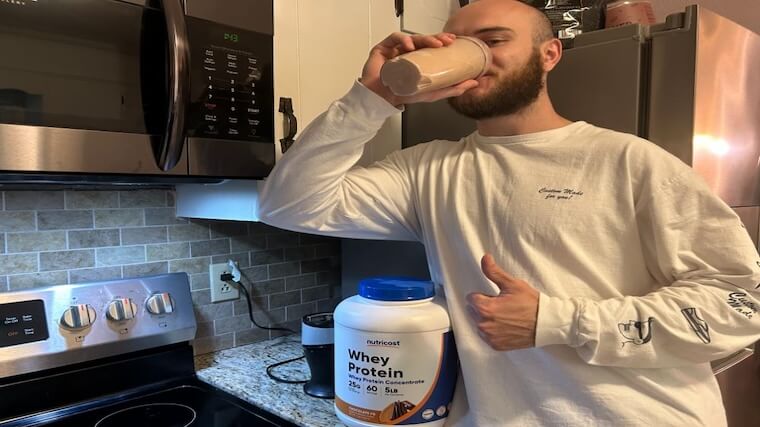
What’s most important is ensuring you consume adequate calories and balance all three macronutrients — protein, carbs, and fats — based on your dietary and protein needs. That’s why discussing your nutritional requirements with a medical professional is essential.
Dietary Restrictions and Preferences
Find a protein powder that suits your dietary restrictions and preferences, whether dairy-based options like whey isolate and casein or plant-based alternatives such as pea protein, soy protein, hemp protein, and chia seed protein. Since most plant proteins are incomplete (with exceptions like soy and pea), choosing a plant-based blend can help ensure a comprehensive amino acid profile.
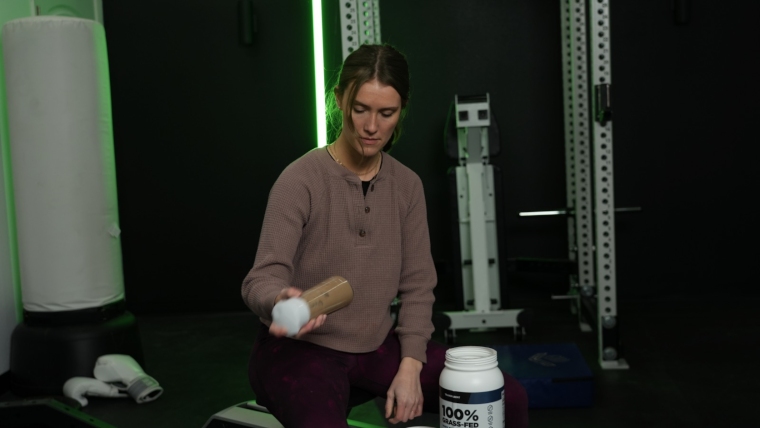
Beyond the source of protein, consider if you need gluten-free, allergen-free, low-lactose, or low-sodium options.
Use
While our trusty shaker bottle remains a staple, protein powders mix seamlessly into smoothies, oatmeal, and more. Think about your primary use — if shakes are your go-to, pick your favorite flavor with superb solubility. Classic vanilla could be a solid addition to your supplement stack for all-around versatility.
Budget
Consider your budget when selecting a protein powder, particularly if you plan for long-term use during breastfeeding or chestfeeding, or while returning to the gym postpartum. To get the best value, compare prices across various platforms — such as the company’s official website and Amazon — to find the most competitive deals. Additionally, take advantage of any rewards programs and subscriptions for extra savings.
Third-Party Testing
The FDA doesn’t closely regulate dietary supplements, so we strongly recommend choosing products that have undergone third-party testing — particularly for pregnant women and other birthing parents.
Protein Powders for Pregnancy FAQs
What is the best protein powder for pregnancy?
The best protein powder for pregnancy depends on an individual’s protein requirements, dietary needs, goals, and preferences. Still, a top choice should offer high protein from high-quality ingredients without compromising taste. After thorough testing and reviews, we’ve selected Ritual Essential Daily Shake Pregnancy and Postpartum as one of the best pregnancy-safe protein powders. Its premium plant-based formula is enriched with choline to support a healthy pregnancy and is third-party tested with traceable ingredients. (3)
Are protein shakes okay to consume during pregnancy?
If you fall short of your daily protein needs through a balanced diet, protein shakes can help supplement your intake. However, always consult a healthcare professional for personalized guidance during pregnancy.
How much do protein powders for pregnancy cost?
Our research reveals that pregnancy protein powders generally cost about $2.18 per serving. However, prices can vary from $0.78 to $3.29, depending on factors like brand, packaging, formulation, and certifications, such as Informed Sport.
Do you need a lot of protein while pregnant?
Protein needs increase during pregnancy, but the exact amount varies based on factors like your weight, activity level, and stage of pregnancy. During the first trimester, the Recommended Daily Allowance (RDA) is around 46 grams, similar to pre-pregnancy levels. However, this increases to about 71 grams daily during the second and third trimesters to support your baby’s growth. (1) The American Pregnancy Association suggests aiming for 75 to 100 grams of protein per day for optimal nourishment. (2)
References
- Murphy, M. M., Higgins, K. A., Bi, X., & Barraj, L. M. (2021). Adequacy and Sources of Protein Intake among Pregnant Women in the United States, NHANES 2003-2012. Nutrients, 13(3), 795. https://doi.org/10.3390/nu13030795
- American Pregnancy Association. (2012, April 27). Pregnancy Nutrition. American Pregnancy Association. https://americanpregnancy.org/healthy-pregnancy/pregnancy-health-wellness/pregnancy-nutrition/
- Jaiswal, A., Dewani, D., Reddy, L. S., & Patel, A. (2023). Choline Supplementation in Pregnancy: Current Evidence and Implications. Cureus, 15(11), e48538. https://doi.org/10.7759/cureus.48538
- Zerfu, T. A., & Mekuria, A. (2019). Pregnant women have inadequate fiber intake while consuming fiber-rich diets in low-income rural setting: Evidences from Analysis of common “ready-to-eat” stable foods. Food science & nutrition, 7(10), 3286–3292. https://doi.org/10.1002/fsn3.1188
- Gorissen, S. H. M., Crombag, J. J. R., Senden, J. M. G., Waterval, W. A. H., Bierau, J., Verdijk, L. B., & van Loon, L. J. C. (2018). Protein content and amino acid composition of commercially available plant-based protein isolates. Amino acids, 50(12), 1685–1695. https://doi.org/10.1007/s00726-018-2640-5
- Cava, E., Padua, E., Campaci, D., Bernardi, M., Muthanna, F. M. S., Caprio, M., & Lombardo, M. (2024). Investigating the Health Implications of Whey Protein Consumption: A Narrative Review of Risks, Adverse Effects, and Associated Health Issues. Healthcare (Basel, Switzerland), 12(2), 246. https://doi.org/10.3390/healthcare12020246
- Mayo Clinic. (2017). Pregnancy weight gain: What’s healthy? Mayo Clinic. https://www.mayoclinic.org/healthy-lifestyle/pregnancy-week-by-week/in-depth/pregnancy-weight-gain/art-20044360
- Belyamani, I., Prochazka, F., & Assezat, G. (2014). Production and characterization of sodium caseinate edible films made by blown-film extrusion. Journal of Food Engineering, 121, 39–47. https://doi.org/10.1016/j.jfoodeng.2013.08.019
- Hertzler, S. R., Lieblein-Boff, J. C., Weiler, M., & Allgeier, C. (2020). Plant Proteins: Assessing Their Nutritional Quality and Effects on Health and Physical Function. Nutrients, 12(12), 3704. https://doi.org/10.3390/nu12123704
- Jouanne, M., Oddoux, S., Noël, A., & Voisin-Chiret, A. S. (2021). Nutrient Requirements during Pregnancy and Lactation. Nutrients, 13(2), 692. https://doi.org/10.3390/nu13020692
- Anguah, K. O., Syed-Abdul, M. M., Hu, Q., Jacome-Sosa, M., Heimowitz, C., Cox, V., & Parks, E. J. (2019). Changes in Food Cravings and Eating Behavior after a Dietary Carbohydrate Restriction Intervention Trial. Nutrients, 12(1), 52. https://doi.org/10.3390/nu12010052
- Elango, R., & Ball, R. O. (2016). Protein and Amino Acid Requirements during Pregnancy. Advances in Nutrition: An International Review Journal, 7(4), 839S844S. https://doi.org/10.3945/an.115.011817
- Liberato, S. C., Singh, G., & Mulholland, K. (2013). Effects of protein energy supplementation during pregnancy on fetal growth: a review of the literature focusing on contextual factors. Food & nutrition research, 57, 10.3402/fnr.v57i0.20499. https://doi.org/10.3402/fnr.v57i0.20499
